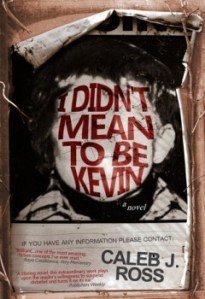Bob Pastorella's Blog, page 2
May 15, 2012
Cut Your Teeth On These: 10 Horror Books You Must Read.
Everyone is looking for the next best thing. Music producers want men and women with the talent, the dedication and the ability to bring something new to the table. I don’t watch American Idol very often, but when I do watch it, I find the most exciting, most entertaining singers are the ones that channel a raw, intense and dynamic vocal style from singers of the past while putting their own twist on it. There is no doubt these young singers listened to their own idols and tried to capture the voices they heard in their own way. Many of the singers have had vocal training, which is expected and encouraged. But that drive to express themselves with their voices, it started from listening to the singers that came before them.
Their inspirations ignite the fire to find themselves.

Son of the Endless Night
Writing is no different. We practice our craft by being inspired, then trying to capture that magic on the page with our own words. The more we practice, the better we become. Part of that practice is also reading. It’s the vicious cycle of writing. To write, we must first read. Fortunately, if you’re writing Horror fiction, there’s plenty to read. When talking to younger writers, it amazes me to find that as well read as they are, they are missing some essential reading material. I’m older, so I do have the advantage of relishing the moments when the books I cut my teeth on were released at the book stores.
But just because these books are older, some even out of print, doesn’t mean they should be forgotten.
These 10 books represent the essential reading prerequisite for writing Horror Fiction. I learned something about writing with each of these books; the importance of folklore and legends, genre mashups, how to blow up a scene, developing a character to advance the plot, dialogue and crisp writing, it’s all with these books. This is not a Bob’s Favorites List. I don’t know if I can ever complete my own top 10 list, simply because I firmly believe the best books have not been written yet. But if you write Horror Fiction, and you do not know these books, then you might have a little reading to do. Please note, there are no Stephen King books in this list. You should read all of his books if you write Horror, even his shitty books.
All of these choices are modern, as in written after the 1960’s, and all are available in some form or another.
In no certain order:
Rosemary’s Baby by Ira Levin. The only true ‘Classic’ in the bunch. Levin’s mastery of dialogue is at an all time high in this novel, as is his pacing and plotting. The perfect horror novel, this small tome delivers the scares without ever actually showing you anything.
The Ceremonies by T.E.D. Klein. With the exception of a collection of novellas, this is Klein’s only novel. That doesn’t matter. He didn’t set out to write a Horror novel with this one. Nope, his goal was to write THE Horror Novel, and he succeeded beautifully. An homage to Arthur Machen, Klein leads us into the woods to meet an ancient horror as old as time itself, and it wants to live again.
The Tribe by Bari Wood. I mentioned this book in one of my other blogs, and believe it deserves mention again. Woods takes a legend and makes it personal. Perhaps a little too melodrama for some, but if you want to know how to make folklore and legend scary, start here and learn from one of the best.
The Cipher by Kathe Koja. Koja’s first novel blew the doors off Dell Abyss cutting edge Horror line. There’s a hole, and it seems to be alive. Damn, it bit me. Let’s drop a video camera down in it. Crazy shit here folks, thank God it’s only a story. Long out of print, this book fetches a high price, but perhaps Kathe can get a ereader edition out there one day.
The Damnation Game by Clive Barker. This first novel from Barker immediately proved he had the chops to write beyond the short story and novella. A classic Faustian tale with twists and gore only Barker could write, though written with a wisdom far beyond his splatterpunk brethren.
Floating Dragon by Peter Straub. Mr. Straub stepped out on a limb on this one, combining an ancient evil with a nasty chemical leak that sounds like something from today’s news headlines. This one gets a reread by me every couple of years, and it always amazes me how well it’s stood the test of time. It’s a rare book that has one scene, a snippet really, with imagery so strong that it has fueled many a nightmare, even twenty plus years after the first read.
Seeing Red by David J. Schow. The only collection in this list, but it is a must read. Schow coined the term ‘splatterpunk’, but this is so much more than that. Schow is smart, real smart, and it shows. His ability to change voices, conjure up descriptions that defy gravity, and still manage to make you throw up a little in your mouth, and like it, places him at the top of my list of most influential writers. Long out of print, this book popped up recently for the Kindle at $2.99, a steal if you ask me.
The Parasite by Ramsey Campbell. One of the most awarded and celebrated authors of my early years, copies of Campbell’s The Parasite are usually quite expensive. Recently rereleased in a limited special edition, I think the price was around $500.00. It’s probably more than that now. Find it used and have it shipped, so worth the money. Campbell’s tale of spirit possession, conspiracy theories and nazi occultists. I will admit this book starts a little slow after the prologue, but if you can hang in there, Campbell has some nightmares he like to start for you.
Son of the Endless Night by John Farris. One of the most underrated writers of Horror Fiction, Farris slayed me with this book, if only for one long scene. Definitely one of the greatest ‘what if’ moments in Horror Fiction, Farris gives us a demon possessed man in a courtroom. Let me just say this isn’t The Devil’s Advocate by a long shot.
The Keep by F. Paul Wilson. Vampires, with a twist. Well researched and very scary, this is the book that made me a F. Paul Wilson fan forever. He captures the atmosphere, both figuratively and literally, expertly, and his pacing is impeccable. Kinda out of print, but now a Kindle edition is out for $2.99. What a steal.
There you have it peeps, these are the essentials. Cut your teeth on these, and you’ll soon be inspired to sing with the masters.








April 17, 2012
WriterDrome: That’s What She Said
WriterDrome is a monthly ongoing discussion concerning the mechanics and logistics of writing Horror, Speculative, Dark Fantastic, and Noir Fiction. The aim here is to discuss the many dynamics necessary to write, edit and publish these genres in a continuously changing landscape. Remember, opinions mentioned here are just that, opinions. I’m no expert, but I’ve been writing for a long time, and I feel there is a lot I can pass on to my fellow writers. Lively discussion is highly encouraged.
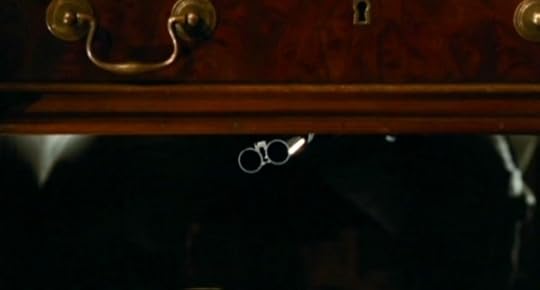 WriterDrome: That’s What She Said: Dialogue Part I
WriterDrome: That’s What She Said: Dialogue Part I
Ask any beginning writer why have dialogue in a story and they’ll tell you that dialogue is how characters give one another information. The fallacy in this line of thinking is that dialogue, communication, is how real people give one another information. The characters in our stories are not real people. Our characters are only as real as is needed for the story, which is the very tip of the iceberg of what a real person is.
So if our characters are not real people, then why do they speak to each other?
Our character’s dialogue serves one purpose only: To advance the plot.
So how do we use dialogue to advance the plot of our story?
One day I’ll cover the plot in more detail, but for this essay, here’s the basics. You should NEVER plot like this:
Plot Point A, and then Plot Point B, and then Plot Point C, and then, etc.
PLOT LIKE THIS:
Plot Point A, BUT Plot Point B, therefore Plot Point C, BUT, etc.
Our character’s dialogue follows in this fashion as well. It is how dialogue advances the plot. This means that the words your characters say to one another must be significant. Every word counts, even the words you leave off the page.
“I explained it all to you in the car. It was so simple. Did you understand what I wanted you to do?”
“Yes.”
“Then why didn’t you tape the gun under the desk?”
“I don’t know.”
Taken out of context, this exchange, though crude, appears to have all the mechanisms to make it work in a story. But if our goal is advancing the plot with dialogue, then all we’ve really done is set ourselves up for another exchange. We are delaying the scene. Granted, there are times when this may be necessary, but let’s say that this is not one of those times. Let’s say this is one of those times when the tension is high. One character is wondering if the other is turning against him. He wants to know why he failed to tape a gun under a desk. “I don’t know.” is only delaying the confrontation, and you, the writer, badly need a confrontation.
Remember, you don’t need an ‘and then’, you need a ‘BUT’, a ‘therefore’. If all your writing is ‘and then’ dialogue situations, then your dialogue isn’t going anywhere, and it’s certainly not advancing the plot.
Remember: Never ‘and then’. Always ‘BUT’, always ‘therefore’.
The “I don’t know.” sentence in the dialogue example above is an ‘and then’ statement.
“I explained it all to you in the car. It was so simple. Did you understand what I wanted you to do?”
“Yes.”
“Then why didn’t you tape the gun under the desk?”
“I did tape the gun under the desk.”
BAM! See how it works? Like I said, this is a crude example, but the dynamics are there. Instead of a delay, now you’re advancing the plot. You could have written a dozen different statements there, all affecting the outcome a dozen different ways. The novice writer would have went for the the delay because that’s how the scene played out in his head. The character might have not wanted to say anything out of fear, or because he’s playing the other side of the deal, whatever. But that scene the writer played out in his head is how ‘real people’ would have done it. Remember, our characters are not real people, so their dialogue isn’t real, and the words they say to one another are only used to advance the plot.
Okay, okay…so you want a little hesitation. No problem, just add a Physical Tag. (More on Physical Tags in Part II next month.)
“I explained it all to you in the car. It was so simple. Did you understand what I wanted you to do?”
“Yes.”
“Then why didn’t you tape the gun under the desk?”
Johnson squirmed in the leather seat. “I got scared, okay. Scared out of my mind.”
Not as strong as the previous fix, but it’s not an ‘and then’ statement, so we are advancing the plot with an obstacle that must be overcome.
Sometimes it’s not the words you say, but how you say them.
“I explained it all to you in the car. It was so simple. Did you understand what I wanted you to do?”
“Yes.”
“Then why didn’t you tape the gun under the desk?”
“I taped the gun under the damn desk just like you told me, okay.”
Notice the last sentence is a statement, not a question. This is important because we are mimicking real speech. When you read this sentence and your mind doesn’t see the ‘?’ at the end, the brain doesn’t hear the natural voice inflection at the end like we hear when someone asks us a question. By making the last word a little higher in pitch, we force the listener to make note that we’ve asked them a question.
“I explained it all to you in the car. It was so simple. Did you understand what I wanted you to do?”
“Yes.”
“Then why didn’t you tape the gun under the desk?”
“I taped the gun under the damn desk just like you told me, okay?”
In this exchange, the reader hears the higher pitch in the last word, and instantly doesn’t believe the character. Add the squirming in the chair bit, and I won’t believe a word that character says again until he’s proven trustworthy later on, if that happens at all.
Sometimes, it’s not the words we say, or how we say them, but the words we don’t say.
“I explained it all to you in the car. It was so simple. Did you understand what I wanted you to do?”
“Yes.”
“Then why didn’t you tape the gun under the desk?”
Johnson turned his head and stared out the window, jaw muscles grinding.
The silence is golden here, because we, as well as the other character, know that Johnson screwed up. The exchange doesn’t end in an ‘And then’ but with a ‘BUT’, which is how we want the exchange to end.
If your plot is nothing but a long string of ‘and then’ situations, then your dialogue will be the same. And then the words your characters say to one another will be flat and lifeless. As writers, flat, lifeless dialogue is the kiss of death, so make the words your characters say to one another significant. When the words they say are significant, then you are advancing the plot, and the reader, to the finish line words: The End.








March 20, 2012
WriterDrome: Walk The Line, Chalk Line, Panty Line, Outline.
WriterDrome is a monthly ongoing discussion concerning the mechanics and logistics of writing Horror, Speculative, Dark Fantastic, and Noir Fiction. The aim here is to discuss the many dynamics necessary to write, edit and publish these genres in a continuously changing landscape. Remember, opinions mentioned here are just that, opinions. I'm no expert, but I've been writing for a long time, and I feel there is a lot I can pass on to my fellow writers. Lively discussion is highly encouraged.
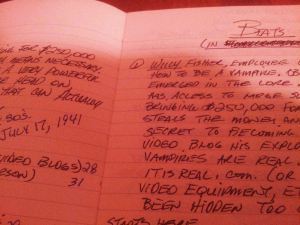 WriterDrome: Walk The Line, Chalk Line, Panty Line, Outline.
WriterDrome: Walk The Line, Chalk Line, Panty Line, Outline.
Figured that would get your attention. Nothing like the title of a good 'ole Johnny Cash song to pop a buzzword in your head, right? Today I'm going to discuss a topic most writers despise: Outlining. To some extent, there are some writers that enjoy outlining. For some, the real thrill is not in creating worlds and characters and getting the story down on the page, but in the plotting and researching, and outlining, then plotting some more. Then more plotting and outlining.
When do they ever get any writing done?
Usually never. They are too bogged down in the mechanics of the story to let it live a little, to let it have a life of its own. Trust me, I know this all too well. I have a project on the back-burner right now because I plotted it out too completely, too thoroughly.
So, if outlines are so bad, why use them at all? If you are thinking about the standard Roman numeral, Alphabetical, Numerical Outline, then yes, that form is bad, in my opinion. Of course, that may be what you use, and if it works for you, then great, keep using it. To me, that form of outline is great for research papers and such, where form, structure, and organization mean just as much as the content of the article. When I started writing longer stories, that was the only form of outline I knew, so I used it constantly. Back then I felt a need to know every aspect of the story, not just the Beginning, Middle and End, but all the parts and characters in between. I felt it was necessary to know exactly, to the detail, how the story was going to end. Using the Standard Outline format allowed me to track that progression to the very end, and made for some boring stories that read flat and dry.
Every story, no matter the scope or setting, needs organization. Even if your story doesn't follow any linear path, you do need to know where you are going with the characters. Surely they will guide you in the story as their situations progress, but what happens when Vincent Vega doesn't take Mia to Jack Rabbit Slims, and Captain Koons never delivers the gold watch to Butch? Without these seemingly unrelated events, you would never get to see Butch kill a very surprised Vincent when he went back to get his gold watch in the hotel room. There's no doubt in my mind that Quintin Tarantino originally wrote Pulp Fiction in chronological order, then rearranged the scenes to the order we are more accustomed too. To do this, he used a form of outlining to make sure each and every motivation aligned not just with the specific character but also with the story he wanted to tell.
The form of outlining screenwriters use is called Beat Pages. Each beat, or scene, is briefly sketched out on a page in chronological order. By chronological order, I mean scenes that possibly began long before your actual story starts. You may never use those scenes in the story, but that doesn't mean they aren't important. As a matter of fact, the best writers rarely use those beats, because they're not necessary to tell the story. They are necessary in most cases for the writer to write the story, and shouldn't be overlooked. This is the form of outlining I use, and it is much more effective than the Standard Outline. It is a much looser outline, and more open to change in character and structure.
David Morrell, author of First Blood, Totem, The Brotherhood of The Rose, and many more novels and short-stories, uses a little different outlining method. Starting with a blank piece of paper, he writes a conversation with himself about the project he's thinking about. It starts with something as innocent as:
"Hello David, how are you today?"
"I'm fine."
"What is on your mind?"
"I was driving home and saw this…"
He then goes on to talk about what he saw. He will usually ask himself why that particular thing made an impression on him, why does he feel it is so important. Always asking why, why why. The good thing about this form of outlining is that if you ever get stuck, you can go back to that conversation and reread what you wrote. You can even write to yourself again, asking why you feel like you are stuck in the story, what you might be able to do to get around it, whatever. It's all about connecting with the characters and their story, reliving the emotions you felt when you first thought of the idea, sometimes long before that idea is a story.
One thing I learned from outlining is to never plot your scenes out too far in advance. Sometimes the whole story will come to you at once, prompting you to outline it all out. That's fine, some writers work best that way. But if you are anything like me, you'll soon find yourself at odds with the outline you so meticulously constructed. You will feel imprisoned by the twists and turns of the story characters. As you struggle through the words you realize that the perfect ending is not exactly what your story people have in mind. Conflicted, you push away from the project, unable to break through the walls of the world you created.
There is hope. Stepping away from the project is a good idea. Sometimes the distance makes us fonder. If you are that far gone and trapped by the outline, then do yourself a favor and find the outline pages with the ending of the story and separate those pages from the outline. Take those ending pages, fold them up, and hide them. You might need them later, but for right now, you just need to forget about them. Work on another project, maybe a short-story, perhaps another novel. Just occupy yourself with another project, something different, even in a different writing style than what you are accustomed. The whole idea is to forget that perfect ending, or at least make its details fuzzy and out of focus. Eventually, if the story is meant to be told, you will come back to the project refreshened and open to new suggestions from your story people about how to resolve their plight.
This can certainly be done at the beginning stages as well. My latest project, Sirens, suffers from the same fate as mentioned above. I'm working on another project now to make myself forget the ending I trapped myself into. When outlining a story now, I purposely don't write the ending. Sure I may write a couple of notes, but I do not write out the ending scenes. If you can get away with not outlining the last act of the novel, then by all means try it. Don't confine yourself before you start pounding out the words.
Finally, it's best to think of an outline as just that; An outline, a chalk line, a panty line, designed to merely give us an idea what it is we want to write about. A hint of the story is what we're after. Nothing in an outline is etched in stone. Remember, the best way to remember something is to write it down. So practice writing your outline down once, try to leave off the ending if you can, and use the outline as a road map to your imagination.
Happy outlining.








February 14, 2012
WriterDrome: The Writer’s Block
WriterDrome is a monthly ongoing discussion concerning the mechanics and logistics of writing Horror, Speculative, Dark Fantastic, and Noir Fiction. The aim here is to discuss the many dynamics necessary to write, edit and publish these genres in a continuously changing landscape. Remember, opinions mentioned here are just that, opinions. I’m no expert, but I’ve been writing for a long time, and I feel there is a lot I can pass on to my fellow writers. Lively discussion is highly encouraged.
The Writer’s Block
 I’ve been hearing a lot of talk about Writer’s Block lately. Apparently, the month of January is notorious for it. Fresh off the holidays and it’s a new year, and you really need to get to work on your project. There’s some excitement. You’ve taken your break and now it’s time to get down and dirty with some words. Only when you stare at the screen, or the blank sheet of paper in your notebook if you’re more of an analogue writer, those words you’ve been thinking about just don’t want to come out. Bad thing is, the more you try, the more they want to stay in your head and not on the page.
I’ve been hearing a lot of talk about Writer’s Block lately. Apparently, the month of January is notorious for it. Fresh off the holidays and it’s a new year, and you really need to get to work on your project. There’s some excitement. You’ve taken your break and now it’s time to get down and dirty with some words. Only when you stare at the screen, or the blank sheet of paper in your notebook if you’re more of an analogue writer, those words you’ve been thinking about just don’t want to come out. Bad thing is, the more you try, the more they want to stay in your head and not on the page.
Why is this?
For the past month, I have been asking myself this very question. Trust me when I say that I honestly do not have a shortage of ideas to write about. Are these ideas actually stories? Maybe not, but with a little thought these ideas could become stories I could write about. But what about the project I wanted to write about, the one I worked on in longhand, plotting and planning, and writing little snippets of dialogue and lists of things my characters wear, eat, drink, like, hate? Why won’t the words come for that story?
For me, I cannot answer that question. I’ve spent, wasted, too much time wondering about something that in the big scheme of things, really doesn’t matter. Some of you may be able to answer the question of why you are ‘blocked’ on your pet project, but knowing the answer may not help you get back on track. To me, this is writer’s block. It’s not the inability to put words on the page, but the inability to get past wondering why you can’t put words on the page.
It doesn’t matter.
It really doesn’t matter.
Especially if there’s something else you want to write about. That may be the thing that’s ‘blocking’ you from your pet project, and the longer you ignore it, the longer you will stay ‘blocked’.
So why don’t you work on something else in the mean time? For many, this is akin to cheating on your spouse or lover. How dare you even suggest this, Bob! Well, yes, I do dare suggest it. I hope your pet project gets raging jealous that you would even think of writing something else.
How does one prevent this blockage from happening?
With my project Sirens, I have the entire story plotted out in a notebook. Beginning, middle and end. All of it. One of the things I’ve read about writing is to not plot too far ahead. Apparently, whoever wrote that was right, because now there’s no flexibility in the story. If this is a project that you’ve just recently plotted and planned, then there really might not be a problem. But if it’s something you worked out ahead of time, say like a year or more, then getting to work on it could prove to be just another way to get a migraine. Time has passed, and as much as you liked the plot you worked out, unconsciously things have changed. Even when you turn off your computer or put the cap on your pen, your brain is still writing. Even if you have to blow the dust off that notebook when you are finally ready to give it a go, your mind has still been working on that story, and it probably has some different ideas than what you previously wrote. When you write something down, even once, it’s carved in stone in your memory, which is a little different than the creative side of your mind.
I honestly believe that I left no flexibility in the story I waited over a year to start working on, and by doing so, even though my mind has been working on it ‘behind the scenes’, my memory has not. This is a conflict. Having some flexibility in the story could solve this problem. Something as simple as thinking of how you want the story to end, but not writing it down at all, can have a profound effect on the words you write, and the story you tell. Now you have some adaptability in the story, allowing your characters to have some breathing room.
Another way to prevent this is to avoid working on it too much at all. This is probably a little easier said than done because we always seem to be working on something, or at least have several irons in the fire, working on another side project surely couldn’t hurt, right? I personally have a hard time doing this because when I finally have an idea that wants to grow up into a story, I have to at least make some notes about it.
What should you do when you are ‘blocked’? Having a plethora of ideas to work from helps. I have several Moleskine notebooks lying around for just this kind of thing. Some only have a few pages of notes in them, but it’s usually just enough to get the words flowing again. This ‘block’ thing can turn into a kind of fear. Trust me, I felt it. Am I good enough for this? What am I thinking, writer’s write. I’m a failure. It’s easy to let those thoughts in. I started to think of all the things I’ve accomplished with writing, and though it is certainly not a lot by any stretch of the imagination, I realized that I’m only human, and I can write, that I am not a failure. Eventually the old drive kicked in. I’m back to writing, and really liking the words that are getting on the page.
Last but not least, it’s is okay to work on another project. It’s not cheating. I feel that working on something else right now will actually help me break through whatever is blocking me from Sirens. I have to accept the possibility that working on something else may not help me as well. That probably wouldn’t be good for Sirens, but it might be good for me, and I’m the writer, so it’s definitely me first, the story second.








WriterDrome: The Writer's Block
WriterDrome is a monthly ongoing discussion concerning the mechanics and logistics of writing Horror, Speculative, Dark Fantastic, and Noir Fiction. The aim here is to discuss the many dynamics necessary to write, edit and publish these genres in a continuously changing landscape. Remember, opinions mentioned here are just that, opinions. I'm no expert, but I've been writing for a long time, and I feel there is a lot I can pass on to my fellow writers. Lively discussion is highly encouraged.
The Writer's Block
 I've been hearing a lot of talk about Writer's Block lately. Apparently, the month of January is notorious for it. Fresh off the holidays and it's a new year, and you really need to get to work on your project. There's some excitement. You've taken your break and now it's time to get down and dirty with some words. Only when you stare at the screen, or the blank sheet of paper in your notebook if you're more of an analogue writer, those words you've been thinking about just don't want to come out. Bad thing is, the more you try, the more they want to stay in your head and not on the page.
I've been hearing a lot of talk about Writer's Block lately. Apparently, the month of January is notorious for it. Fresh off the holidays and it's a new year, and you really need to get to work on your project. There's some excitement. You've taken your break and now it's time to get down and dirty with some words. Only when you stare at the screen, or the blank sheet of paper in your notebook if you're more of an analogue writer, those words you've been thinking about just don't want to come out. Bad thing is, the more you try, the more they want to stay in your head and not on the page.
Why is this?
For the past month, I have been asking myself this very question. Trust me when I say that I honestly do not have a shortage of ideas to write about. Are these ideas actually stories? Maybe not, but with a little thought these ideas could become stories I could write about. But what about the project I wanted to write about, the one I worked on in longhand, plotting and planning, and writing little snippets of dialogue and lists of things my characters wear, eat, drink, like, hate? Why won't the words come for that story?
For me, I cannot answer that question. I've spent, wasted, too much time wondering about something that in the big scheme of things, really doesn't matter. Some of you may be able to answer the question of why you are 'blocked' on your pet project, but knowing the answer may not help you get back on track. To me, this is writer's block. It's not the inability to put words on the page, but the inability to get past wondering why you can't put words on the page.
It doesn't matter.
It really doesn't matter.
Especially if there's something else you want to write about. That may be the thing that's 'blocking' you from your pet project, and the longer you ignore it, the longer you will stay 'blocked'.
So why don't you work on something else in the mean time? For many, this is akin to cheating on your spouse or lover. How dare you even suggest this, Bob! Well, yes, I do dare suggest it. I hope your pet project gets raging jealous that you would even think of writing something else.
How does one prevent this blockage from happening?
With my project Sirens, I have the entire story plotted out in a notebook. Beginning, middle and end. All of it. One of the things I've read about writing is to not plot too far ahead. Apparently, whoever wrote that was right, because now there's no flexibility in the story. If this is a project that you've just recently plotted and planned, then there really might not be a problem. But if it's something you worked out ahead of time, say like a year or more, then getting to work on it could prove to be just another way to get a migraine. Time has passed, and as much as you liked the plot you worked out, unconsciously things have changed. Even when you turn off your computer or put the cap on your pen, your brain is still writing. Even if you have to blow the dust off that notebook when you are finally ready to give it a go, your mind has still been working on that story, and it probably has some different ideas than what you previously wrote. When you write something down, even once, it's carved in stone in your memory, which is a little different than the creative side of your mind.
I honestly believe that I left no flexibility in the story I waited over a year to start working on, and by doing so, even though my mind has been working on it 'behind the scenes', my memory has not. This is a conflict. Having some flexibility in the story could solve this problem. Something as simple as thinking of how you want the story to end, but not writing it down at all, can have a profound effect on the words you write, and the story you tell. Now you have some adaptability in the story, allowing your characters to have some breathing room.
Another way to prevent this is to avoid working on it too much at all. This is probably a little easier said than done because we always seem to be working on something, or at least have several irons in the fire, working on another side project surely couldn't hurt, right? I personally have a hard time doing this because when I finally have an idea that wants to grow up into a story, I have to at least make some notes about it.
What should you do when you are 'blocked'? Having a plethora of ideas to work from helps. I have several Moleskine notebooks lying around for just this kind of thing. Some only have a few pages of notes in them, but it's usually just enough to get the words flowing again. This 'block' thing can turn into a kind of fear. Trust me, I felt it. Am I good enough for this? What am I thinking, writer's write. I'm a failure. It's easy to let those thoughts in. I started to think of all the things I've accomplished with writing, and though it is certainly not a lot by any stretch of the imagination, I realized that I'm only human, and I can write, that I am not a failure. Eventually the old drive kicked in. I'm back to writing, and really liking the words that are getting on the page.
Last but not least, it's is okay to work on another project. It's not cheating. I feel that working on something else right now will actually help me break through whatever is blocking me from Sirens. I have to accept the possibility that working on something else may not help me as well. That probably wouldn't be good for Sirens, but it might be good for me, and I'm the writer, so it's definitely me first, the story second.








January 26, 2012
Booked & Caleb J. Ross, Two Names That Go Great Together.
I'm going to keep this update short and sweet so you can get to your homework assignments.
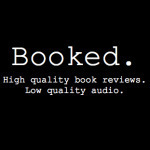 Those crazy cats at Booked have been reading again.
Those crazy cats at Booked have been reading again.
 This time they tackle not one, but two new Caleb J. Ross novels, As A Machine & Parts and I Didn't Mean To Be Kevin.
This time they tackle not one, but two new Caleb J. Ross novels, As A Machine & Parts and I Didn't Mean To Be Kevin.
See I told you, short and sweet. Click here to listen to the podcast and click the colored links above to BUY CALEB'S BOOKS!








January 16, 2012
2012: The Year of the Bat-Dragon
Happy New Year!
Talk about late, huh.
The Christmas and New Year season taps my creativity. There's just too much stuff to do, plus the Daily Grind is typically busy as Hell during December. I'm not going blame my absence or lack of creativity on Skyrim or Batman: Arkham City. Okay, okay, so I am going to blame it on those two games. Deal with it.
So what's in store for Obscuradrome this year? Let me start by saying WriterDrome is coming back, hopefully this month. Expect some guest posts there as well. Don't know who the guests will be, but the good news is that some of them don't know either. I'm working on Sirens this year for Write Club 2012, as well as a couple of novellas and some short stories. 2011 was a stellar year for me publishing wise, so I hope to repeat my successes again this year. And as always, I'll be promoting (pimping) my friends successes as well, so be prepared.
Okay, back to reading/writing for me, see you guys real soon.
Bob.








November 30, 2011
Booked Podcast Reviews In Search of a City: Los Angeles in 1,000 Words & Interviews Thundadome Writer’s Collective editor Michael Paul Gonzales
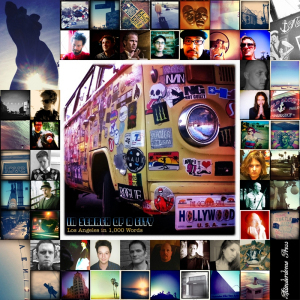 Talk about the ultimate stocking stuffer for the holidays, this book is it. Independently produced, and for the reading impaired, it also has some kickass photos. In Search of a City: Los Angeles in 1,000 Words contains photos from the stomping ground of Thundadome Writer’s Collective editor Michael Paul Gonzales and features 26 stories based off each picture, all exactly 1,000 words. Haunting, compelling, and literally impossible to put down, this collection shows a readers Los Angeles from a fresh and innovative perspective.
Talk about the ultimate stocking stuffer for the holidays, this book is it. Independently produced, and for the reading impaired, it also has some kickass photos. In Search of a City: Los Angeles in 1,000 Words contains photos from the stomping ground of Thundadome Writer’s Collective editor Michael Paul Gonzales and features 26 stories based off each picture, all exactly 1,000 words. Haunting, compelling, and literally impossible to put down, this collection shows a readers Los Angeles from a fresh and innovative perspective.
Booked Podcast reviews the book, and if you click here you can listen to it.
Please take the time to LIKE Thundadome’s Facebook Page and get a coupon code to save $5.00 off the price. Now that’s something we can all get excited about.








Booked Podcast Reviews In Search of a City: Los Angeles in 1,000 Words & Interviews Thundadome Writer's Collective editor Michael Paul Gonzales
 Talk about the ultimate stocking stuffer for the holidays, this book is it. Independently produced, and for the reading impaired, it also has some kickass photos. In Search of a City: Los Angeles in 1,000 Words contains photos from the stomping ground of Thundadome Writer's Collective editor Michael Paul Gonzales and features 26 stories based off each picture, all exactly 1,000 words. Haunting, compelling, and literally impossible to put down, this collection shows a readers Los Angeles from a fresh and innovative perspective.
Talk about the ultimate stocking stuffer for the holidays, this book is it. Independently produced, and for the reading impaired, it also has some kickass photos. In Search of a City: Los Angeles in 1,000 Words contains photos from the stomping ground of Thundadome Writer's Collective editor Michael Paul Gonzales and features 26 stories based off each picture, all exactly 1,000 words. Haunting, compelling, and literally impossible to put down, this collection shows a readers Los Angeles from a fresh and innovative perspective.
Booked Podcast reviews the book, and if you click here you can listen to it.
Please take the time to LIKE Thundadome's Facebook Page and get a coupon code to save $5.00 off the price. Now that's something we can all get excited about.








November 29, 2011
A Gift of Words
Merry Christmas!
Yeah, no Happy Holiday's from me, you guys know better than that. It's Merry Christmas! I want to take a little bit of time here to promote a cause. Of course, we should never forget the reason for the season. Never forget why we celebrate Christmas, and never let the cornucopia of corporate media overkill influence you otherwise.
In spreading Christmas cheer, sometimes we are perplexed by what to buy our loved ones for gifts. I understand, it happens to me every year. As the days tick away, it can get a little nerve-wracking. Allow me to suggest some gifts for those that are hard-to-buy-for who enjoy reading.
Get them books. Seems simple, right? But what books? Well, you can always take the easy way out and buy a gift card at the local Barnes & Noble or Books-A-Million, or get one at any outlet that sells Amazon gift cards. At least you will be guiding your friends and family in the right direction. If you prefer a little more personal experience, then please listen to what I have to say, and do not hesitate if you truly decide to do this, because time's a-wasting.
First, buy books from Small Presses. Why? Because, like the music industry and film industry, the Small Presses are publishing the best damn books on the market today. I read quite a bit, and of course rarely miss any books by my favorite name-brand authors, but honestly, some of the best books I've ever read didn't come from a traditional publisher like Random House or Doubleday.
So what Small Press books are good? Glad you asked. And please forgive me if you've heard of some of these titles here already. Most are so good they deserve extra mention.
 It Came From Del Rio by Stephen Graham Jones, published by Trapdoor Books. Check out their website for some more great titles.
It Came From Del Rio by Stephen Graham Jones, published by Trapdoor Books. Check out their website for some more great titles.
Southern Gods by John Hornor Jacobs, published by Night Shade Books, an awesome Independent Small Press, and you should definitely check out their catalogue.
The Samaritan by Fred Venturini, published by Blank Slate Press, another small press doing great things.
Stranger Will by Caleb J Ross, published by OtherWorld Publications.
Transubstantiate by Richard Thomas, also published by OtherWorld Publications.
Stay Go d by Nik Korpon, also by Otherworld Publications.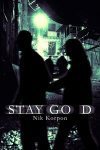
These should get you started. Now, a word of caution here. Chances are you will not be able to find some, if not all, of these books at your local corporate bookstore. Guess what people? That's the idea. This is the pause for the cause. Guess who might have these books, or might be able to get them for you rather quickly?
Say it with me now. Your. Local. Independent. Book. Store.
Don't have one in your area? No problem. By all means, please place your orders with the publishers directly, or go to Amazon. The corporate bookstores that don't carry these books can order them as well, but that defeats the purpose of my whole post here. Independent Book Stores are run by people who know books, read books, and love books. They're not doing it because it's a great way to make money, but because they love what they do. Same with Independent/Small Press publishers. Most authors I've spoken with at any length who are published far and wide tell me they enjoy working with small independent publishers the most because they really care about the product, which is the book you or your friend will eventually have in their hands.
If you find yourself unable to venture too far from the NY Times Bestseller list, please, go to your closest used book store and purchase the book there. It's not how much you spend, it's the words within yourself that make all the difference in the world.
Coming up, another podcast from those Booked guys, and hopefully next week, after a month break, the return of WriterDrome.
PS. Of course, you could just order the most awesome short story collection ever, Warmed And Bound. Just saying…










